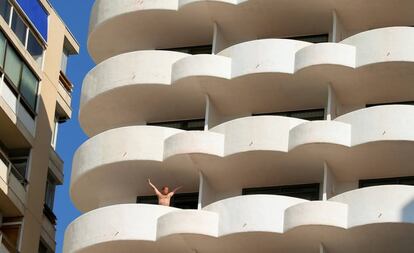Problem of ‘balconing’ makes a comeback, with six dead so far this summer
The most recent incident saw a 23-year-old German plunge to his death from the 12th floor of his hotel after he fell through a window

The latest victim of balconing had spent just a few hours in Palma de Mallorca in the Balearic Islands before he died. The 23-year-old German man had traveled to the island for a vacation with his friends near Palma beach. Like many other young Germans who spend summer in the tourist hub, where restaurants, stores and bars line the seafront, he went out with his friends to have a drink and some fun.
‘Balconing’ consists of usually drunk tourists jumping from balcony to balcony, or jumping from their rooms into the swimming pool
But when he returned on Monday evening, the 23-year-old went to the 12th floor of the hotel he was staying at and, under the effects of a yet-to-be-determined toxic substance, fell from one of the windows in a corridor. He landed in the interior courtyard and died.
The young German is the sixth person to die so far this summer from so-called balconing, a term that refers to usually inebriated tourists falling from hotel or apartment block balconies, jumping from balcony to balcony in their hotels, or attempting to launch themselves from great heights into swimming pools.
Four more people died after jumping from balconies in hotels and apartments in Magaluf, a beach resort in Mallorca, and a 14-year-old teenager was killed after falling from the second floor of a hotel in Muro Beach. Dozens more have been injured after jumping from balconies in establishments across Mallorca and Ibiza.
Neither the visitor pamphlets warning tourists against balconing nor the fines for those caught doing it, nor the awareness campaigns from the British Travel Agency Association have been able to put a stop to the practice. While last summer there were only five cases – none of them fatal – this year the number of incidents has skyrocketed.
A 14-year-old was killed after falling from the second floor of a hotel
“The Consulate must put more pressure on the British government to create campaigns with people hurt by balconing who can help stop the problem,” says Joan Espina, the manager of a hotel in Magaluf. “The campaigns they have done in recent years have helped to prevent more accidents.”
The hotel industry has worked for years with local authorities and the home countries of balconing victims to try to put a stop to the deadly practice.
Hoteliers refuse to take responsibility for the accidents, arguing that their establishments provide hotel guests with information pamphlets, always try to place groups of young people on the ground or lower floors, and comply with both the European and national norms that regulate construction conditions. Inspections are carried out every year to ensure these norms are met, they add.
“I work with more than 20 agencies,” says Espina, “and many of them have their own security group that is in charge of carrying out inspections. They don’t send their customers to unsafe establishments.” According to Espina, many hotels have even increased security at night to prevent accidents.
Fines
Palma de Mallorca and Calviá City Hall have imposed fines for people who try to cross from one balcony to another. Six tourists have already been slapped with €600 charges by Calvía City Hall.
Magaluf is one of the epicenters of the balconing problem, with one establishment in the resort town, Eden Roc apartments, holding the record for the highest number of accidents. Three people have died here: a 19-year-old British woman died in April after trying to enter her apartment from a window, a young Irish man died after jumping from the seventh floor, and an 18-year-old British man died last July after falling from a height of several meters and whose body was not found until the following day. Eden Roc does not advertise via travel agencies and its owners have refused to talk to the press. The establishment has been forced to put up fences to try to curb future accidents.
Drug consumption
“The consumption of substances leads to highly risky behavior that you would not have in other circumstances, particularly when it comes to young people,” says Miquel Roca, professor of psychiatry at the University of the Balearic Islands. The professor is looking to work with doctors from the Son Espases University Hospital on a study into the causes of these types of accidents. “Prevention and change of behavior campaigns are very complex. If a study was done, we would be able to determine how these campaigns should be used and address them to groups with very specific risk factors,” he explains.
Every year the British Travel Agency Association launches campaigns to stop balconing accidents, with pamphlets advising tourists to “never lean [over the balcony], do not cross onto another balcony and do not pass items from one balcony to another over the railing.” But these campaigns seem to have little effect. And as Nikki White, head of the association’s Destination and Sustainability department says, one careless moment “can have a devastating effect, not only on the tourists but on the families and friends who are affected by accidents with irreversible consequences.”
English version by Melissa Kitson.









































